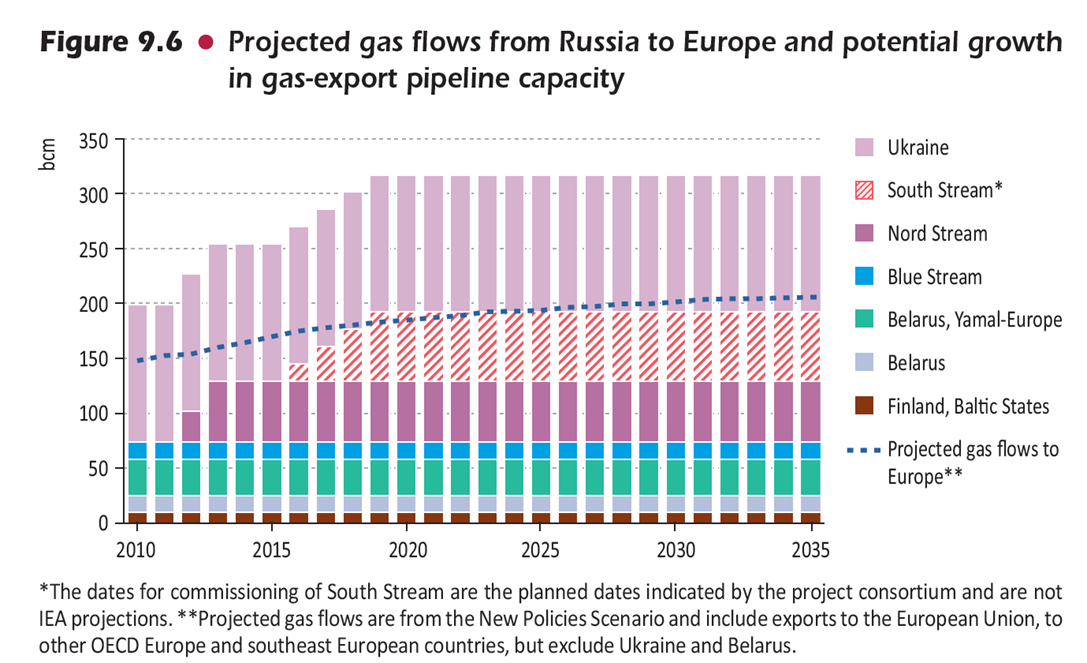Bluff, empire-building or no better project?
Will South Stream “West” be built, and will Gazprom shoot itself in the foot? Or will the current plans be scrapped? We’re rooting for the former…
In our previous post on the Nabucco pipeline, we explored the factors (basically everything) that have taken an unfavorable turn for the investment over the last couple of years: the pipeline is more expensive, demand has fallen, while alternative supply is still on the rise (just to name the most important ones).
These same reasons also hold true for South Stream, Gazprom’s controversial parallel project, which would transport gas from below the Black Sea through Bulgaria, Serbia, Hungary and finally Slovenia, all the way to Italy. Actually, it is quite possible that the pipeline backfires, thus easing the region’s dependence on Gazprom – this is why we are actually crossing our fingers that the project is realized. The more the potential transport options, the more intense the competition, and the more difficult it becomes to apply “divide and conquer” tactics, by selling gas to certain countries at a marked-up price. Nonetheless, in the current situation South Stream would be a drastic waste of resources from an economic perspective.

The planned route of South Stream. Source: south-stream.info
No investor would realize this project (rumored to cost around USD 40 bn) based purely on profit motives, especially given that its aim is not even to bring new Russian gas to Europe; its goal is simply to eliminate an already weakened Ukraine as a transit country of Russian gas export routes.
In exchange for the large transit volumes, Ukraine used to buy gas much cheaper than other European countries. But the Putin-Tymoshenko agreement of January 2009 put an end to that: now Ukraine must also pay a lot more for its gas; its bargaining position has deteriorated precisely because of alternative gas transport routes. In fact, Ukraine is currently trying to find ways to buy cheaper gas from the west (Hungary and Slovakia).Ukraine isn’t in the major leagues anymore
The Russians have basically already circumvented Ukraine by constructing the North Stream pipeline, which is able to transport 55 Bcm of natural gas from Russia directly to Germany under the sea each year. Cumulative Russian export capacity to Europe reaches 250 Bcm annually, while actual exports are around 150 Bcm. (This means that only 25 Bcm has to flow through Ukraine if all existing alternative capacities were completely put to use.) See the chart below on demand trends and changing Russian export capacities.

Source: IEA
Bluff, empire-building or no better project?
Of course, the fact that South Stream is not economical does not mean that Gazprom won’t build it after all – the question is its true purpose. This, however, is rather difficult to discern. Is it all just a bluff to undermine Nabucco (or some other alternative pipeline)? Or another example of the typical Russian empire-building mentality, a proposal to be rammed through whatever the costs? Perhaps yet another showcase investment to enrich a few privileged oligarchs? Industry experts and Kremlin watchers alike are themselves divided over this issue, and the question of whether South Stream will be realized after all.
Most recently András Deák wrote a guest post here on the blog, in which he basically argued that since Gazprom is awash with cash, it will probably rather construct South Stream than see the money fall into the Russian state’s hands.
Regardless of the hype over official signatures or the laying down of the pipeline’s foundations, I don’t believe that South Stream will be realized according to the current plans. Why? Because Gazprom’s logic dictates that they will be the only ones with the right to use it for gas transport. They think that no one else has any say, much less access, to the pipeline. But this is very unlikely.
EU regulations interfere
According to current EU energy market regulations, third parties must by default be granted access to gas pipelines. Pipeline infrastructure is a natural monopoly, similar to a motorway: two parallel, competing roads won’t get built, but everyone has the right to use it so long as they pay the toll.
Special exemption is required to limit third party access in certain cases. Gazprom did in fact receive this exemption with regards to North Stream, but such external use was never really an option given that no other country along the route between Russia and Germany had additional resources to feed into it. (German anti-monopoly authorities had previously granted exemption – in line with some rather strict conditions – to some of the smaller pipelines running from North Stream’s German endpoint, but the European Commission has basically overruled this.)
Will Gazprom shoot itself in the foot?
Gazprom’s effective monopoly could perhaps somehow be upheld over the eastern half of the South Stream pipeline, since neither Turkey nor Serbia are members of the EU (and won’t join for a while yet). But between Hungary and Italy (what we might call South Stream “West”) the pipeline would only run between EU countries. In such cases, not only must third party access be granted to ensure transport transparency, but flows in the opposite direction should also be enabled. (Exemption from the latter is only possible in certain very specific cases.) And with an ever stricter EU, it gets more and more difficult to play the blame game, “Oh, the pump reversing the flow isn’t working again…”.
If others can also access the pipeline, and if reverse flows are enabled, then South Stream could potentially be used to transport liquefied natural gas (LNG) from Italian import terminals all the way to Hungary – but that may just be wishful thinking on our part. Or it could bring back Russian gas sold cheaper to Italy from somewhere else. (Where exactly gas is cheaper is subject to change, as the case of Ukraine trying to import from the west highlights.) Therefore, South Stream may lead to Gazprom unwillingly supporting the development of a more integrated European natural gas market. This is particularly ironic since Gazprom has the most to lose with such a development, as it would mean an end to gas price discrimination, where the countries lacking alternative sources (such as Hungary) are forced to pay more.
 Will Gazprom shoot itself in the foot? Source: youtube.com
Will Gazprom shoot itself in the foot? Source: youtube.com
The European Commission has not yet received an official exemption request with regards to third party access to South Stream. Nonetheless, it is very unlikely that South Stream “West” would be granted such an exemption. The pipeline does not meet several important preconditions: basically, it would not ensure greater market competition (if others’ access is blocked). Case in point: the EU’s anti-monopoly proceedings against Gazprom, which suggest that Brussels is not letting them off easily. (Furthermore, without an official EU ruling on third party access, it’s not possible to make a final investment decision (FID) on the project, so the recent signature-buzz has probably just been a PR trick.)
Go South Stream “West”!
So we’re crossing our fingers for a South Stream “West” which would be accessible by all players. But be warned: the last time we endorsed someone on this blog (“Go Mario Monti!”), he did, in fact, go – by resigning just a few days later…;)
A bejegyzés trackback címe:
Kommentek:
A hozzászólások a vonatkozó jogszabályok értelmében felhasználói tartalomnak minősülnek, értük a szolgáltatás technikai üzemeltetője semmilyen felelősséget nem vállal, azokat nem ellenőrzi. Kifogás esetén forduljon a blog szerkesztőjéhez. Részletek a Felhasználási feltételekben és az adatvédelmi tájékoztatóban.




